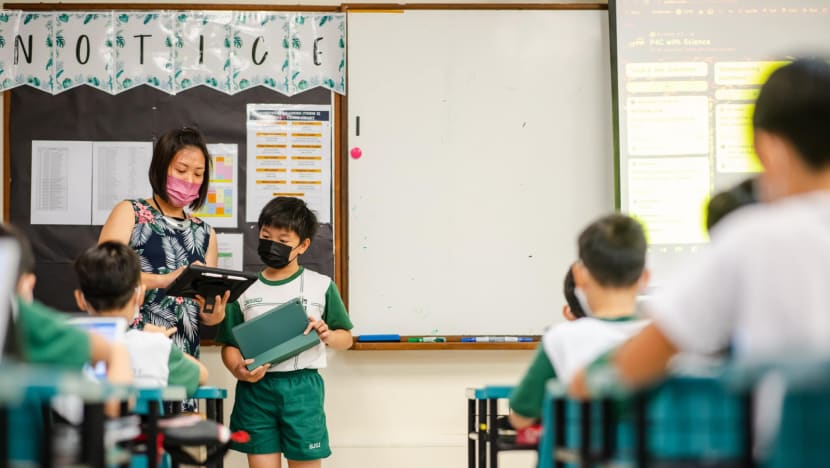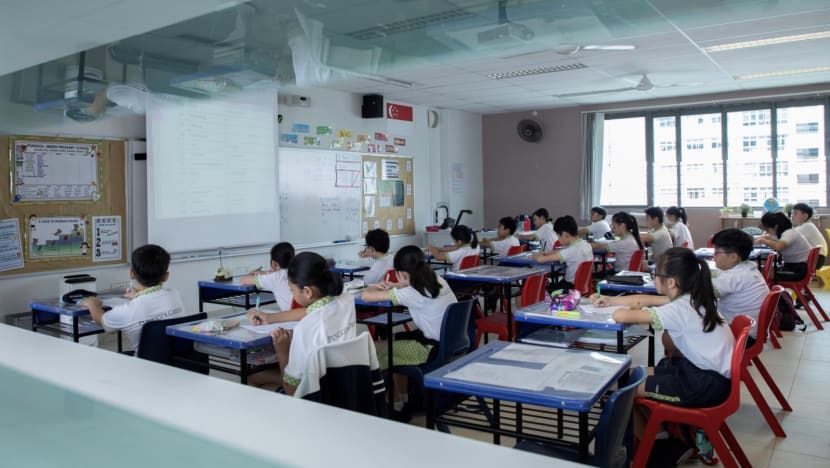Revamped Gifted Education Programme could lighten teachers’ workload, says Chan Chun Sing
The Education Minister also spoke to CNA938 about how parents should choose a school based on their child’s strengths and choice, instead of whether it is a “good school”.

A teacher and a student from St Joseph's Institution Junior using an iPad in the classroom. (Photo: Facebook/Chan Chun Sing)

This audio is generated by an AI tool.
SINGAPORE: Schoolteachers who are concerned about having more work to do under the revamped Gifted Education Programme (GEP) will experience the opposite instead, said Education Minister Chan Chun Sing on Wednesday (Aug 21).
“In the past, if we were unable to cater to the specific needs of the students, it actually made teaching much more difficult,” he noted.
“If we are able to identify the students according to their abilities, (this) allows our teachers to lighten their workload by being much more focused in their teaching. It is something that most people don’t see.”
Mr Chan also reiterated that parents should choose a school based on their child’s strengths and choice, and not whether it is a “good school” – a topic that has constantly been debated over the years.
Mr Chan was speaking to CNA938 days after Prime Minister Lawrence Wong announced in his National Day Rally speech that the gifted programme will be overhauled to become more inclusive.
The GEP, which was introduced in 1984 and caters to intellectually gifted pupils, will be replaced with high-ability programmes in all primary schools. It will be implemented from this year’s Primary 1 cohort.
Under the current GEP, students across all schools are identified through a two-stage exercise in Primary 3.
Those selected are invited to join from Primary 4, with only nine primary schools offering the GEP. The programme takes in about 1 per cent of the cohort, or 400 to 500 students each year.
As part of the overhaul, school-based programmes for high-ability students will be expanded to about 10 per cent of the cohort, or 3,000 students.
Already, all primary schools have such programmes to develop high-ability pupils with specific strengths and interests in subjects like English, mathematics and science. About 7 per cent of the cohort is part of these programmes.
MOVING AWAY FROM "TEACHING TO THE AVERAGE"
On Wednesday, Mr Chan pointed out two aspects of how he will assure teachers that they are not overloaded with day-to-day tasks and responsibilities of conducting classes.
The issue of teachers feeling overworked and burnt out is a perennial one in Singapore. The government said earlier this year that it has been reducing the amount of administrative work that teachers do.
Mr Chan said one aspect of addressing teachers’ concerns is continuing to equip them in their training and supporting them with logistics arrangements.
“So that part is the easy part, but actually, there's another interesting aspect of this arrangement,” he added.

He said that by being “much more targeted” in how students are grouped together in classes, teachers can be “much more focused in the way they conduct the classes”.
“We say that we want to have students who have all abilities mixed in the same class for social, emotional development, bond-building,” Mr Chan noted.
“But we must also have a care for our teachers, because you cannot have a class where people are so diverse in their abilities, and then the teacher can't end up catering to the diverse needs and we end up doing what we call ‘teaching to the average’.”
Such a system is where students’ abilities are assessed by a single dimension.
Mr Chan said that before deciding to revamp the GEP, the ministry approached teachers, parents, and GEP alumni who gave feedback on this system and on developing children’s social and emotional skills beyond being good at certain subjects.
“We don't think we should just look for general high abilities. We should allow people to develop what we call the peak talents, be in a specific subject, and not deprive children with specific peak talents from joining the programme,” he added.
The Ministry of Education previously said the new model will provide more customisation for students who may be talented in one or two specific areas, rather than offer a “uniform” GEP curriculum in all areas.
For example, a student who is strong in English and weak in Mathematics may participate in the high-ability programme for English in their school after doing well at the selection test they take at Primary 3.
As their talents grow more evident, they may then be identified to attend after-school modules for English later on in Primary 5.
ALLOCATION OF RESOURCES
In terms of how MOE will allocate resources, such as specialised teachers and facilities to support schools in implementing high-ability programmes, Mr Chan said a “slight adjustment” will be made for teachers in “regional centres”.
These centres are certain schools across Singapore where students take after-school modules.
The ministry wants to ensure there are enough teachers to conduct the modules, and also make sure that students do not have to travel too far to attend them, he added.
“So perhaps in every town, a few schools can come together to form a cluster, and we will have probably slightly more … schools than the current nine that allow us to conduct such regional programmes,” he said.
Such regional centres can also be moved depending on the distribution of students across the island, Mr Chan noted.
PARENTS SHOULD INVOLVE CHILDREN IN DECISION-MAKING
On the topic of parents’ mindsets, Mr Chan addressed a question on how MOE plans to engage parents to adopt the notion that all schools are good schools.
The phrase “Every school, a good school” was popularised by former Education Minister Heng Swee Keat over a decade ago, as Singapore sought to move away from an over-emphasis on academic grades.
Mr Chan said parents should consider whether a school is a good fit for their child at his or her current stage of development, and - most importantly - what the child chooses.
“I want all our children to grow up taking responsibility for their own decisions,” he added.
“Of course, parents say: ‘Oh no, you can't make my child make such decisions when they are at this age.’
"But if you think back when we were younger, we all learned to make such decisions and we didn't turn out too badly, because at that point in time, perhaps our parents were not as informed and they let us have the freedom to choose, but they also taught us to take responsibility for our own choices.
“I think we need to (give) our children this space to make decisions and have the space to make decisions,” Mr Chan said.
UNDERSTAND STRENGTHS, WEAKNESSES
The minister also stressed the importance of understanding a child’s strengths and weaknesses.
He gave an example of a thought experiment he runs with parents, where he asks what school they would pick if their child scores 10 or 12 points in the Primary School Leaving Examination.
There is no correct answer to this, he said, as parents really need to know their child.
“Number one: Is your child’s performance a flash in the pan and you will put him in the wrong environment? Will you stress him out?” Mr Chan said.
“Number two: Is your child the fighter, the one who will keep striving that even if he's at the bottom of the class, he will keep striving to prove himself?
“Or is number three: Is your child the type who is a bit more chill and just wants an environment where he can get along with his friends and that will bring out the best in him?
“Or is your child someone who feels, ‘I want to have a different pace, so that I can exhibit or demonstrate or hone my leadership potential, my sports potential, and then I might not want to go to a school that is so competitive on the academic side’?”


















